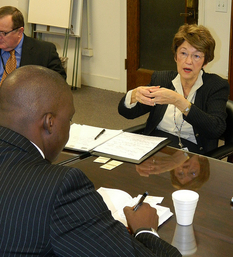
Read the following words and ask yourself which you think are more likely to describe men, which are more likely to describe women? Aggressive, works well with others, dynamic, good administrator, logical, perceptive, assertive, personable, forceful, tactful, true leader. For years I have used a longer version of this exercise in my introductory management course. Consistently most of my students see these words as mostly either masculine or feminine.
The effect of our masculinity-femininity lens can be subtle, easily missed, yet significant in impact. A supervisor can be fair in treatment, actively provide equal opportunity, and still manifest stereotypic tendencies without being aware of it. How? One example is performance appraisals. Analyses of key words, such as those just listed, in written performance appraisals sometimes show sex-role stereotypic traits. A male manager may be described as "a true leader", “dynamic”, “logical”, “assertive”, “forceful”. A female manager, viewed as equally effective, may be described as a “good administrator", "works well with others", “perceptive”, “personable”, “tactful”. Somewhere from within us, the masculine and feminine traits we learned from our childhood may emerge in our writing (and sometimes our speech) unintentionally affecting the opportunities of others.
Image from http://www.flickr.com/photos/ncngpao/8359944332/
Free to share: http://creativecommons.org/licenses/by-nd/2.0/deed.en
 RSS Feed
RSS Feed